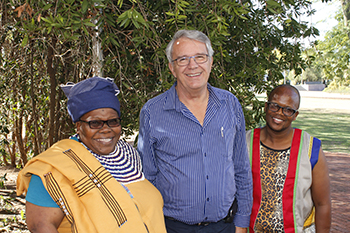Latest News Archive
Please select Category, Year, and then Month to display items
29 August 2024
|
Story Anthony Mthembu
|
Photo Harmse Photography
 Ross van Reenen, CEO of the Toyota Free State Cheetahs.
Ross van Reenen, CEO of the Toyota Free State Cheetahs.
The Business School at the University of the Free State (UFS) recently hosted the CEO of the Toyota Free State Cheetahs, Ross van Reenen, for a guest lecture. Van Reenen presented the guest lecture in the Business School Auditorium on the UFS Bloemfontein Campus on 21 August 2024.
Reflecting on Van Reenen’s address
In a lecture addressed to an auditorium filled with UFS staff and students, Van Reenen’s talk was divided into several sections. Firstly, he spoke about the concept of the ‘black swan’ in reference to the book written by Nassim Nicholas Taleb, titled The Black Swan: The Impact of the Highly Improbable. Referring to Taleb’s book, Van Reenen defined a ‘black swan’ as a rare event that has a severe impact, and the occurrence of which people try to explain. He used some examples to explore this concept as well as its implications, including COVID-19 and its impact on the world, and the tragic death of the people in the Titanic disaster. However, he delved deeper into 9/11 and the extent of its impact, saying that “9/11 was a major wake-up call in the world economy”. Van Reenen highlighted how some companies such as Barclays, for which he previously consulted, had to work to be up and running after the collapse of the Twin Towers in 9/11.
In addition, Van Reenen’s lecture also touched on the importance of the first ninety days of a job after an individual has been employed. “Those first ninety days are crucial, as you have to establish yourself in a company where you are paid less than you are worth,” Van Reenen said. As such, he gave the audience insight into what they could focus on in that time frame. This includes focusing on the small wins, as well as ensuring that you are working at keeping the team together, as the team is an integral part of an organisation.
Van Reenen concluded his address by speaking about his time as the CEO of the Toyota Free State Cheetahs, including some of the decisions he took to ensure the success of the organisation.
UFS Faculty of Theology hosts expert on African Traditional Religion (ATR)
2016-05-20

Dr Nokuzola Mndende, Prof Fanie Snyman (Dean of the Faculty of Theology), and Dr Luvuyo Ntombana (Department Head: Religion Studies) |
Dr Nokuzola Mndende, an acclaimed theologian, researcher, and practitioner of African Traditional Religion (ATR), is often called upon in the media to offer her expert opinion or participate in interfaith panel discussions. Thanks to an initiative from the postgraduate diploma class in the Faculty of Theology and the efforts of Dr Luvuyo Ntombana (Department Head: Religion Studies; Faculty of Theology), Dr Mndende accepted an invitation to present her paper, “From the periphery to the centre: African Traditional Religion in a democratic state”, on the Bloemfontein Campus of the University of the Free State (UFS). In his opening remarks, Dr Ntombana stated that he was heartened by his students’ desire to be “co-workers in knowledge production” by engaging with Dr Mndende.
Dr Mndende’s contention is that African Traditional Religion (ATR) was suppressed throughout colonial times, and, despite a 22-year-old democracy, continues to be moved to “beyond the periphery” by what she terms “spiritual subsets”; those who strive to amalgamate their African Traditional Religion rituals with the practices of Christianity. Quoting statistics from a 1995 survey by the SABC, she stated that ATR is a minority in its birthplace (with only 5% representation), and posed the question: “If ATR is a minority in its place of birth, where is it a majority?” Her presentation put forward the need to study and interpret ATR introspectively, but acknowledged that more “homework” would be needed in this regard.
Dr Mndende thanked the university, Dr Ntombana, and the Dean of the Faculty of Theology, Prof Fanie Snyman, for inviting her, and expressed a desire for the relationship with the UFS to continue.